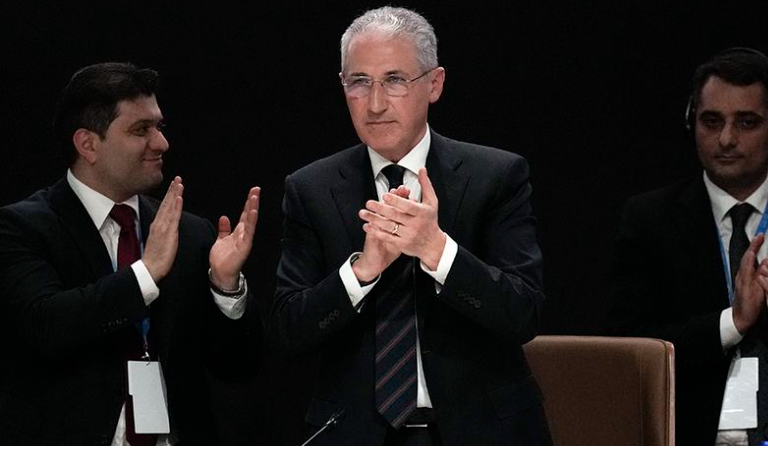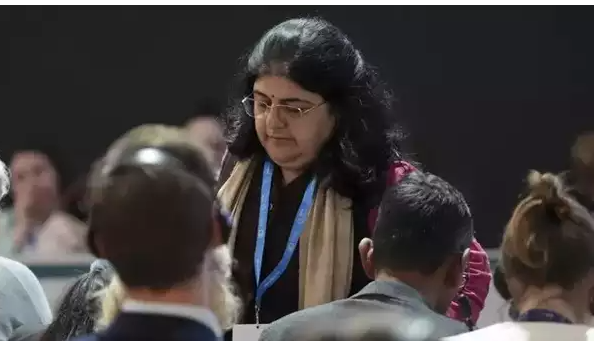1. Introduction: A Divisive Climate Summit
“India Calls Climate Deal recently concluded COP29 in Baku saw intense negotiations, passionate protests, and a controversial agreement to address the escalating climate crisis. Despite a deal to “mobilize” $1.3 trillion annually by 2035, India rejected the proposal outright, calling it a mere illusion that fails to meet the magnitude of the global climate challenge.
The summit, while celebrated by some as a step forward, was marred by dissent from developing nations, “India Calls Climate Deal including India, which highlighted the inadequacies and inequities embedded in the deal.
2. Key Highlights of the COP29 Agreement
Financial Commitments:
- A pledge to aim for $1.3 trillion annually in climate finance by 2035.
- Developed countries agreed to contribute $300 billion annually as a baseline figure starting immediately.
Ambition vs. Reality:
While the numbers appear ambitious, the fine print revealed a lack of binding commitments, “India Calls Climate Deal raising questions about the deal’s enforceability and actual impact.
Focus Areas:
- Renewable energy transitions.
- Climate adaptation measures for vulnerable regions.
- Loss and damage compensation for countries severely affected by climate change.
 For the more information click on this link
For the more information click on this link
3. India’s Stand: A Strong Rejection
“An Illusion, Not a Solution”:
India’s Environment Minister criticized the agreement, stating it does not adequately address the scale of the climate crisis. The Minister argued that the proposed measures disproportionately burden developing nations while allowing developed countries to evade their historical responsibilities.
Lack of Equity:
India emphasized the principle of common but differentiated responsibilities (CBDR), which underscores the need for developed nations to take the lead due to their historical emissions. The current deal, India claimed, “India Calls Climate Deal dilutes this principle.
Insufficient Financial Mechanisms:
India pointed out that the proposed $1.3 trillion target lacks a clear roadmap for mobilization. With only $300 billion as a starting point, the gap between rhetoric and reality remains vast.
4. Developed vs. Developing Nations: The Continuing Divide
Developed Nations’ Perspective:
Countries like the U.S., EU members, and Japan hailed the agreement as a landmark step toward collective action. They argued that the financial commitments, “India Calls Climate Deal though modest initially, set the stage for long-term collaboration.
Developing Nations’ Concerns:
In contrast, nations like India, Brazil, and South Africa criticized the agreement for:
- Shifting the financial burden onto developing countries.
- Failing to address historical emissions and climate justice.
- Ignoring the immediate needs of vulnerable populations.
5. The Role of Protests and Civil Society
Protests at COP29:
The summit witnessed large-scale protests from environmental activists, indigenous communities, “India Calls Climate Deal and youth groups. They accused world leaders of prioritizing corporate interests over genuine climate action.
Civil Society’s Demands:
- Binding commitments for climate finance.
- A stronger focus on loss and damage.
- Greater accountability for major polluters.
6. The Financial Reality: Can $1.3 Trillion Be Mobilized?
Challenges in Mobilization:
Experts have raised doubts about the feasibility of mobilizing $1.3 trillion annually, citing:
- Inconsistent contributions from developed nations.
- Over-reliance on private investments.
- Bureaucratic delays in fund allocation.
India’s Skepticism:
India argued that previous promises, such as the $100 billion annual commitment made at COP15, remain unmet. This track record undermines confidence in the new deal.
7. Climate Justice: A Core Issue
What Is Climate Justice?
Climate justice emphasizes the need to address the unequal impacts of climate change, “India Calls Climate Deal with vulnerable communities and nations bearing the brunt despite contributing the least to global emissions.
India’s Advocacy:
India has consistently called for:
- Fair allocation of resources.
- Greater responsibility from developed nations.
- Technology transfers to aid renewable energy transitions.
8. The Broader Climate Crisis: Why Immediate Action Is Critical
Rising Global Temperatures:
2024 is on track to be one of the hottest years on record, with extreme weather events becoming more frequent and severe.
Impact on Vulnerable Nations:
Countries like Bangladesh, the Maldives, and small island nations are facing existential threats, “India Calls Climate Deal with rising sea levels and unpredictable weather patterns.
India’s Challenges:
As a rapidly developing nation, India faces a dual challenge:
- Balancing economic growth with sustainability.
- Managing the impacts of climate change on agriculture, “India Calls Climate Deal water resources, and urban infrastructure.
 For the more information click on this link
For the more information click on this link
9. Alternatives Proposed by India
A Revised Framework:
India has called for a more equitable climate deal that includes:
- Binding commitments for developed nations.
- Clear mechanisms for technology transfer and capacity building.
- Prioritization of adaptation measures for vulnerable populations.
Domestic Initiatives:
Despite rejecting the COP29 deal, India remains committed to its domestic climate goals, including:
- Expanding renewable energy capacity to 500 GW by 2030.
- Reducing carbon intensity by 33-35% compared to 2005 levels.
10. The Path Forward: Bridging the Gap
Need for Global Collaboration:
The climate crisis requires unprecedented global cooperation. Developed and developing nations must find common ground to address shared challenges.
Strengthening Accountability:
Enforcing binding commitments and enhancing transparency in fund allocation can rebuild trust among nations.
Involving Civil Society:
Greater inclusion of civil society, indigenous communities, “India Calls Climate Deal and youth voices can ensure more inclusive and impactful climate policies.
11. Conclusion: A Missed Opportunity?
The COP29 agreement, hailed by some as progress, has been dismissed by others, including India, as inadequate. While the pledge to mobilize $1.3 trillion signals ambition,” India Calls Climate Deal its lack of enforceability and equity raises doubts about its effectiveness.
India’s rejection of the deal highlights the ongoing divide between developed and developing nations, underscoring the need for a more just and comprehensive approach to the climate crisis. As the world inches closer to tipping points, the question remains: can nations rise above political divides to save the planet. ALSO READ:- “Union Government is Often Branded Anti-Tamil, Says Nirmala Sitharaman” 2024




